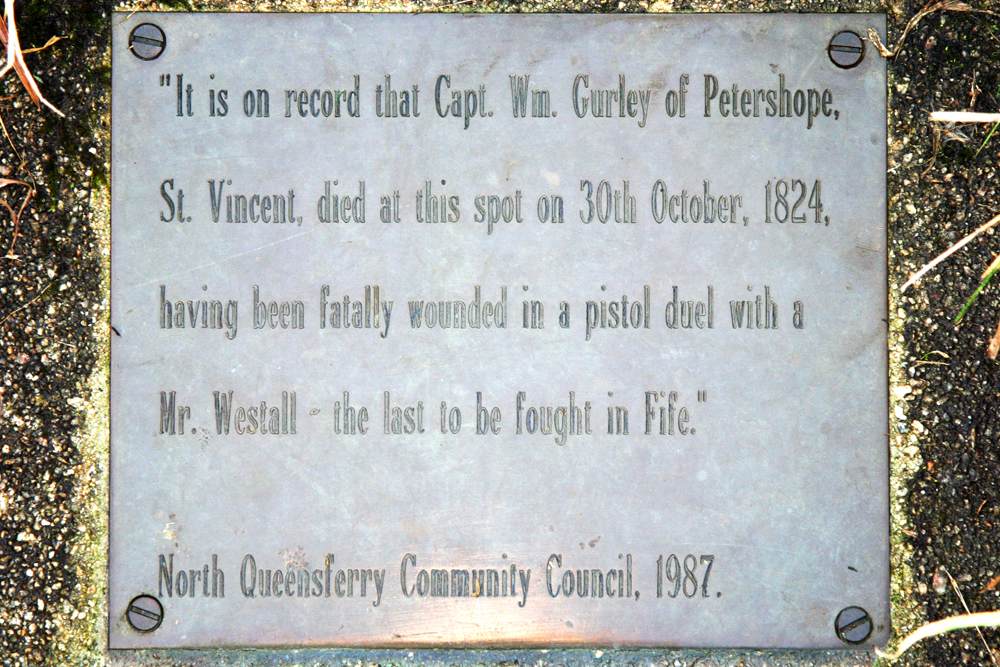The Duel Stone
The Last Duel in Fife?
The Canmore web-site has the following article about the Duel Stone in North Queensferry.

Field Visit (3 April 2012)
Situated within an area of rough ground N of North Queensferry known as Ferryhills there is a commemorative stone that has been erected to mark the spot of the last duel fought in Fife. The small whinstone pillar measures about 0.65m in height by 0.33m in breadth and 0.22m in thickness. Flush with the turf immediately to the E is a small brass plate secured by screws into a concrete pad.
It bears the inscription ‘It is on record that Captain Wm Gurley of Petershope, St. Vincent, died at this spot on 30th October, 1824, having been fatally wounded in a pistol duel with Mr Westall, the last fought in Fife – North Queensferry Community Council 1987’.


Information provided by Joan Leggett to the SVG Ancestry website states that the Gurley family owned the ‘Peter’s Hope’ estate in St Patrick parish, St Vincent, which was established about 1765.
William was born in 1783 and inherited his father’s St Vincent properties in 1810. At that time he was stationed with the 51st Aberdeen Militia at Berwick-upon-Tweed (1810-11) and was married there on 21 April 1813 to Elizabeth MARSH.
In 1824 the family moved to Edinburgh so that Gurley could more easily attend to matters concerning his estate in St Vincent.
On 26 October of that year, when dining with a Mr Barr in the Black Bull Inn, Edinburgh, Gurley argued with John Waistell, a lace representative from London who had previously refused to pay Gurley money owed to him after the St Leger horse race the previous month. A fight subsequently ended in the pair agreeing to a duel to be fought near Arthur’s Seat, Edinburgh, early on 30 October, but this was cancelled as police were seen in the area.
A second attempt, which was successful, resulted in Gurley being killed at Ferryhills. He is buried in Inverkeithing churchyard. A notice of his death appeared in the December 1824 issue (page 768) of the Edinburgh Magazine and Literary Miscellany.

30. Near North Queensferry, William Gurley, Esq. of Petershope, St Vincent’s, Captain in the 55th, or Aberdeenshire regiment of militia. [30. meaning the 30th of the previous month – October 1824]
Although the plaque states that this was the last duel fought in Fife, there is a later contender for that title.
The last duel
The BBC News on-line Magazine carries this article

BBC News’s James Landale retraced the steps of his ancestor who issued the challenge to a duel which took place on 23rd August 1826, just outside Kirkcaldy.
Here is the report:
The last duel
After quarrelling over a bank loan, two men took part in the last fatal duel staged on Scottish soil. BBC News’s James Landale retraces the steps of his ancestor, who made that final challenge.
On 23 August 1826, two men met at dawn in a field just outside Kirkcaldy in southern Fife. Only one walked away alive.
One was David Landale, a linen merchant and pillar of the community. The other was George Morgan, a soldier-turned-banker with a fiery temper.
The pair had quarrelled over a bank loan, an argument that had led the banker to spread rumours about his client’s creditworthiness. The merchant had in turn taken his accounts elsewhere and written a stiff letter of complaint to the Bank of Scotland headquarters in Edinburgh.
And that is where it would have stayed had not Morgan’s temper got the better of him one morning when he struck Landale about the head with an umbrella in Kirkcaldy High Street.
According to eyewitness accounts, Morgan cried: “Take that, sir. By God, sir, you shall more of this yet!”
Before fleeing, Landale replied: “You are a coward, sir, a poor, silly coward.”
One gentleman had assaulted another in public and so Landale had no alternative. He immediately challenged his bank manager to a duel. He wrote: “I must request that you will meet me tomorrow morning at seven o’clock… with pistols and give me the satisfaction which as a gentleman I am entitled to.”
Landale’s decision was driven and guided by centuries of duelling tradition and codes of honour that had emerged from the age of chivalry.
When Europe’s medieval aristocrats were shorn of their private armies by increasingly powerful monarchs, they retained the right to resolve disputes of honour in private combat. They drew on the judicial tradition of trial by combat and the sporting tradition of knightly jousting to create the modern European duel. What began with swords by the early 19th Century ended with pistols.
Landale was a novice shot
Before the duel, David Landale had to prepare. He found a friend to act as his second and then rushed into Edinburgh – he had never fired a shot in his life and needed to buy pistols.
That night, as he put his affairs in order, he wrote to a friend, insisting he was doing the right thing: “In the event of my falling, I beg of you to make no foolish lamentation, as I feel confident before God that I am doing my duty as a Christian and as a respectable member of society.”
The next morning, on the duelling field, Morgan refused to apologise for striking his client.
Following ancient, self-regulating codes that stipulated exactly where the combatants should stand, what they should wear, and how and when they should fire, the seconds acting for Landale and Morgan agreed the terms of the duel.
The merchant and the banker stood 12 paces apart and, on command, fired simultaneously.

Morgan staggered and slumped to the ground, blood pouring from his mouth. Landale, the novice gunman, had fired the straightest and had shot his bank manager dead. He fled the scene immediately.
Thus ended the last fatal duel in Scotland.
James Landale took time out from politics to trace his family history
“Almost 200 years later, I took time off from my job at BBC News 24 to retrace David Landale’s steps and find out just what it was that drove my ancestor to risk everything in a field in Fife.
I’ve dug out the letters, the witness statements, the old newspaper articles, all of which show how history, honour and social pressure left men in his position with no alternative. To maintain his reputation and his honour, he simply had to fight Morgan.”
So what happened next?
David Landale fled south of the border to the Lake District to avoid arrest.
He adopted an alias and kept a low profile, although he wrote to the legal authorities promising to turn up to his trial. One month after the duel, he was tried for murder in Perth but acquitted “with character unsullied”.
And then, 25 years later, in one of those twists you couldn’t make up, the Landale and Morgan families were reconciled when David’s daughter married George’s nephew.
The Last Duel is currently available on YouTube